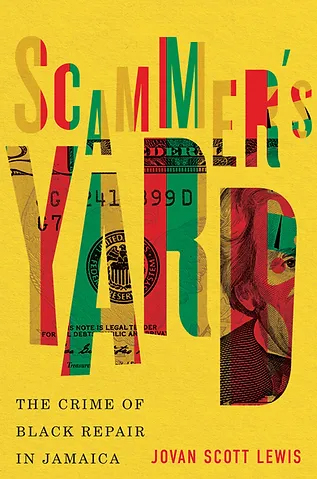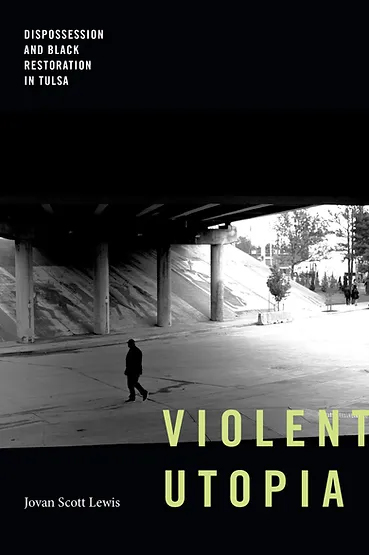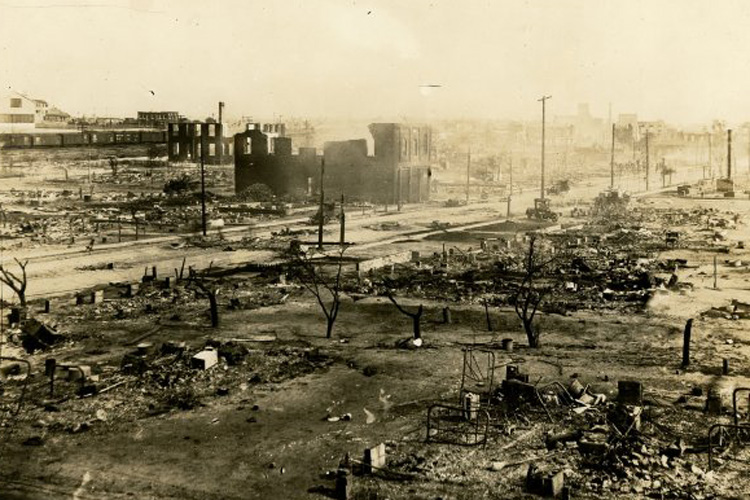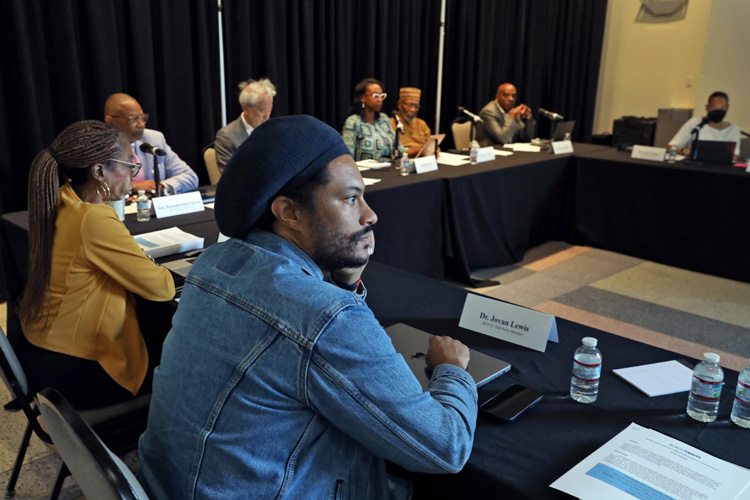What Does California Owe Descendants of the Enslaved?

By July 1, California’s Reparations Task Force must finish its report on the harms African Americans have faced since California became a state in 1850 and recommend how the state should repair the damage for all descendants of enslaved people now residing here.
Task force member Jovan Scott Lewis, a University of California, Berkeley, associate professor of geography and chair of the geography department, said that, for him, the past one-and-a-half years of public hearings have been “an emotionally exhausting historical tour of the injuries that African Americans have faced in this country.”
In meetings held around the state, the task force heard testimony from Black residents about how government at all levels has kept them from succeeding as free citizens of the United States. The denial of jobs, housing, schooling and government funding, the taking of land, and the destruction of thriving African American communities has prevented the accumulation of generational wealth. As a result, many of these communities are impoverished.
Lewis was asked to join the committee because of his academic focus on reparations that is detailed in numerous articles and two recent books: Scammer’s Yard: The Crime of Black Repair in Jamaica (2020), about Jamaicans who justified online scamming of white North Americans as a form of reparations for their ancestors’ enslavement; and his most recent, Violent Utopia: Dispossession and Black Restoration in Tulsa (2022), about the aftermath of the 1921 race massacre and burning of “Black Wall Street” in Tulsa, Oklahoma.
Lewis, who was born in Montego Bay, Jamaica, and grew up in Florida, recently spoke with Berkeley News about his books, the work of the task force, and why reparations — from cities, states and the federal government — are due to the descendants of the enslaved.
Q: You wrote that, in Jamaica, the online scammers justified their criminal activity as “reparations” for centuries of enslavement by England. How does this fit into your idea of reparations?

There’s a difference between reparations and what reparations are meant to produce, which is a sense of repair. What these guys were accomplishing was repair, if not reparations. The scammers unpacked what was a really complex set of geopolitical, historical, racial relationships whereby they felt that the United States, specifically, was a significant contributor to their ongoing poverty and, moreover, there’s no distinction between white people from Britain two centuries ago and white people from America today. The former might have created the conditions, but the latter certainly are part of a system or a government that’s perpetuating them and benefiting from it, because they can come to our country and be a tourist, open up call centers and pay us, you know, a dollar an hour to field your Amazon Prime complaints. There was a really complex chain of custody of injury that these guys saw themselves as responding to.
Q: Do you agree with their justifications?
Because you’re an ethnographer, your job isn’t to go in there and place your own value schema onto the people you’re talking to, but to understand their value schema and to try and make sense of it as a way of contributing to understanding of our broader world and society. When I was doing my fieldwork in Jamaica — I wrapped it up roughly around 2012 — Jamaica was actually in its 50th year of independence. And here’s a young guy, one of the scammers, saying, “Listen, nothing has changed for us. Fifty years of what we can call flag independence hasn’t done anything for me.”
The idea of waiting on being provided repair, a remedy, you know, was a fool’s errand for them. They understood that their ancestors’ labor had been stolen — and the unequal terms under which they were incorporated into the global market economy. They were simply following suit. In a way, the notion of criminality was upended. Their argument was (that) the crime was their poverty, the crime was the conditions, very intentional and constantly being reproduced, that made them poor. The idea of the scam being criminal wasn’t even a question, because their understanding was, “The world we live in is criminal.”
Q: Jamaica was a slave colony of Britain from 1655 until 1838. When slavery was abolished there, did the country pay reparations?
To the planters, yeah. They borrowed £20 million in 1834 to pay the British planters for loss of property. It was a big controversy in 2015 when the UK Treasury sent out a tweet saying, “Hey, you know, we just finished paying off the reparations.” So, from 1834 to 2015, the UK government and taxpayers were effectively paying back slavers and their descendants for the loss of property, by which we’re talking about enslaved persons and lands that were used to exploit them. Haiti paid reparations to France following their independence until about 1948. You’re talking about the first century and change of Haiti’s independence, while suffering under basically international trade sanctions, coup attempts and invasions.
We think of Haiti today as suffering from a particular kind of poverty. Well, that’s because Western nations got together and refused to trade with Haiti, despite the fact that, prior to the Haitian Revolution, Haiti was the most productive of all of France’s territories in terms of crop output. So, the Jamaican scammers understood the general historical condition that they were in and formed from and, for them, it was necessary to do what they had to do to change the circumstances.
Q: In the Tulsa massacre, a white mob killed as many as 300 people in the Greenwood District of Tulsa and destroyed a thriving African American community, including what was referred to as Black Wall Street. The descendants of those who lived in Greenwood actually discussed reparations with the city of Tulsa, though in the end, the city decided to do nothing.

It was worse than nothing. I began my research in Tulsa just after I finished my Ph.D. It was a poor Black community, like many others that I knew, but what was interesting is that there was something different about the kind of narrative these North Tulsans told about themselves and their history. It wasn’t some of the narratives that I had encountered, say, in other Black urban areas where there was a faulting of the external community. It wasn’t like, “Oh, well, those people are doing that to us.” It was actually, “We have to do better, we have to actually heal our community. We have to build our businesses. We have to collaborate, we have to cooperate.”
That’s because there’s a history in this place, right? There was Black Wall Street and Greenwood, and going back even further, there’s a whole history of all-Black towns in Oklahoma that came into being during the period pre-statehood when that area of the state was Indian territory. I was able to draw this connection between the kind of contemporary ethics of community formation and reproduction back to this geography of Indian territory and the ways that Black communities saw themselves as needing to be self-reliant.
In the independence movements in the Caribbean, there was that same principle of self-determination, or what we might politically call sovereignty. And so, for me, it was clear that in North Tulsa there was a history of sovereignty that I think these individuals were working to recover. Violent Utopia is about how this community lost the sense of sovereignty and how they have worked to recover it amidst the ongoing and repeated violence of the state. The question of reparations is different than, I think, the most common North American narrative, which is reparations for slavery. What you have in Tulsa is reparations for the project of repairing that community.
Q: They were seeking remedy for what happened after slavery.
Their original harm is in slavery. But no one that I interviewed or spent time with in Tulsa talked about slavery. It was, “No, we want to rebuild our North Tulsa community. We want to rebuild Greenwood.” For me, that was really important because it showed me that there were really multiple narratives of Black life in this country that aren’t just all centered on slavery or the plantation South. Instead, there are different moments that different Black communities hold as their origin point. And it’s important for us to understand that, because when we think about policy, when we think about everyday discourse around anti-Blackness and so forth, we tend to think in very singular terms. And I think that that’s a significant mistake.

Q: How do you even make a decision about reparations if everybody’s idea of reparations is different?
Well, you know, I’m working on it. But that philosophy is something that I bring into the California Reparations Task Force, which I’ve been on since June of 2021. When you think about reparations in a place like California, it demands that we actually ask this question: What is the relationship to slavery as an origin point in this quest for racial justice?
What we do know is that positioning reparations primarily as an issue of reparations for slavery typically undermines the claim altogether, because to most U.S. citizens — I think to most California residents today — 2023 feels so entirely removed from the history of African enslavement and African American enslavement in this country that they feel, you know, no basis for bearing any responsibility for it. And we know that California entered into the union as a so-called free state where there wasn’t the practice or industry of slavery.
Now, to be sure, there were enslaved Black people in the state of California in 1850. There were enslaved African Americans who worked in the gold mines, when their owners brought them from other parts of the country where there was slavery. We also know that the state of California, as a part of entering into the union, had to participate in upholding the Fugitive Slave Act, where they did return free Black persons to their owners in the South, or wherever. So, there isn’t a complete guilt-free relationship to the actual practice and phenomenon of slavery in California.
So, for sure, California did not have an institution of slavery. However, what we know is that slavery and the principles behind slavery and the enslavement of African American people were part and parcel of the formation of the state of California. This goes back as far as governors who explicitly wanted to exclude Black people from coming to the state, who introduced a series of racist codes in the state that end up being foundational to the state. You have, again, this custodianship, right? One can easily trace a similar custodianship of anti-Blackness, of racism, state racism, racist policy in the foundation of the state, by looking at the founding governors.

As a result of that, there were lingering effects of slavery that showed up, that impacted and really formed the experience of African Americans in this state. And so, when we’re talking about reparations in California, we’re talking about reparations not for slavery itself, but for this system of governance around Black people, around African Americans, that slavery initiated. That slavery represents the kind of initial and formative philosophy, from Jim Crow straight through to mass incarceration and even gentrification today. This idea of being able to discriminate and dispossess African Americans as a form of policy — or if not policy, then acceptable practice, lingering to today.
I think it’s critical that we have some nuance in our understanding about what these various Black communities suffered, what they continue to suffer, and how we’re meant to create a kind of reparative remedy around those experiences.
Q: There’s a widely held perception that this means giving money to all Blacks. In fact, a commission created by San Francisco’s city council recommended giving $5 million to every Black resident of the city. Is that the solution for past and current harms?
We think of reparations as being some form of restitution of an injury. To my mind, reparations is not meant to solve racism. That is a societal commitment, a societal responsibility, our responsibility today. We’re talking about reparations for historical horrors. Reparations are saying, from this point, going back in history, “You and members of your community have faced a series of events and atrocities and harms, and our commitment is to righting those harms through some form of restitution, through some form of transactional remedy.” We look at the total sum of all of those harms, and we put a price to it. That’s what we do.
Q: As a member of the nine-person task force, you are actually overseeing a group of some 75 people in the California Department of Justice who are trying to add up all the harms Black Californians have endured, to come up with a dollar figure for the state, right?
My responsibility is overseeing the calculation and ultimately the recommendation for the direct compensation figures. You know, if you get injured in a car accident, someone comes out and assesses the damage and says, “Okay, you know, you might have lost an appendage. We cannot give you back your appendage, but this is what we think your appendage is worth,” and they give you that money.
We haven’t released any numbers yet, but what I will say is that cash payment is about responding to the historical harms. A part of reparations should be working to guarantee the non-repetition of those harms. Sometimes the guarantee of non-repetition will need to be policy, like a general anti-racist policy, and that’s wonderful. And if we’re saying, well, one of the harms that Black Americans faced in the state of California was being denied loans, then we could make sure that that community is no longer denied loans, which would look like a kind of future-facing, anti-racist policy. But it is actually a response to the historical harms and guaranteeing against a repetition of that particular harm.

Q: Are cash payments likely to be a recommendation of the task force?
So, the question that you’re asking is, “Is it appropriate for reparations to be individually serving, or must they be collective?” I think that is a really tough question. It is the question that I wrestled with in my first book, where I said, “What does it mean for these individual scammers to say that what we’re doing is reparations when it serves nobody else beyond them and maybe their families?” They just went and built houses and bought cars and paid for private schools and did things that, once you start adding them up, feel like, “Oh, well, those are the kinds of things that sound like the fully endowed benefits of citizenship. Being able to go away and choose where you want your kids to go to school and choose how you want to spend your money.” And so, I think, in a way, it is appropriate for reparations to be individually serving because the guarantee from emancipation was that Black Americans would be free Americans.
When you think about it, by comparison, white wealth and white mobility developed on the basis of individual choice and preference that had been secured by government policies. So, racial covenants, permitting white communities to remain white — that individual choice has created what we think of as the benefits of being white Americans. We can debate what those benefits are. But there wasn’t a policy, in other words, that said, “Here is how you as white people have to go and form communities.” There was no policy that said, “Here is how you have to go and pursue education and where you need to pursue education.”
In the same way, if reparations are overdetermined by policy prescription, then it actually doesn’t represent freedom at all. It isn’t reparations. It is some other government policy that is meant to dictate how African Americans live their lives. And that doesn’t sound like it’s meeting the mark of justice, in a way. For our part in the task force, we are looking at something that is actually really comprehensive.
Q: What specifics can you share about the task force’s likely recommendations?
There are five areas that we have determined are appropriate for direct compensation, things like property takings, the impacts of mass incarceration on communities. Then, there are other areas, such as environmental racism, where we are saying, “There needs to be a policy prescription to respond to those harms.” What we have is really a comprehensive program that’s in the works that would look like part financial compensation, part actionable policy. And then, of course, there is a very precise community of eligibility that the reparations are meant to be for: the descendants of those enslaved on American soil.
While we’re not providing reparations for slavery, per se, the way that the bill that formed the task force, AB 3121, was written was that the harms that we are tracing begin in slavery. If you are saying that’s the origin point, that means dealing with the experiences of that injured community across time. Anybody who is of African descent who arrives in this country at any particular time in history is seen as Black or African American. Not all of them have that very specific relationship to the American institution of slavery.
Q: In your recent book, you mention that Black Tulsans just wanted to be free to succeed like the white population. Are reparations meant to achieve that?
That’s right. African Americans, when asked what they would want following emancipation, they basically said, “We want land, we want tools, and we want to be left alone, to just go away and do what we need to do.” And despite the failure of reconstruction, within a half century following emancipation, African Americans in this country owned nearly 40% of agricultural land. That’s compared to just over 1.3% today. A century ago, there were over 120 Black-owned banks in the country, at the height of Jim Crow. And yet, we’re talking about barely a fraction of that number existing today. The story of Black Wall Street and North Tulsa or Greenwood is a testament to the fact that African Americans have proven time and time again that if their communities and their individual industries aren’t interfered with, they go about the work of building a life for themselves like everybody else has done.
Q: The Legislature will have to make the final decision about reparations, but do you anticipate white backlash to the task force’s recommendations?
Probably. What we have to do is convey to all Californians that this history really is part and parcel of California’s development, and that government policy has been directly behind the accumulation of wealth among white Californians and white Americans, generally. For example, we think about Social Security as being this wonderful thing, but African Americans were effectively barred from contributing to Social Security for basically the first 30 to 40 years of the program by virtue of discriminatory policies based upon industries that qualified. You’re talking about a generation of African Americans who were unable to kick-start the wealth generation that so many of us today take for granted.
When you think about the ways that housing policy was developed post-World War II to actively subsidize and support white Americans and white Californians, when you think about the benefits of the GI Bill, you’re talking about white wealth being actively supported, the financial equivalent of reparations being provided to create and prop up and reproduce white communities. Whereas, racial covenants in housing deeds prohibited African Americans from living where they wanted to live. We can go on and on, right? That being coupled with the fact that there were equal policies that actively worked to undermine African American incorporation and African American development. There are two sides of this that we have to make clear to California’s residents. And I think if we could do that, then, you know, this kind of backlash that you talk about might be subdued, to some extent. There’s a significant advantage that white citizens today, white residents of the state of California, have inherited. And that’s what we have to tell as honestly and as genuinely and sincerely as we can.
Q: Are you surprised that California’s task force has spawned others — in New York state, for example, but also in cities like Los Angeles, San Francisco and Berkeley.
Reparations has been a question for this country for centuries, since the foundation of this country’s independence, when a woman, Belinda Royall, in Massachusetts, said, “Okay, now we’re free. We should be having reparations.” (Royall petitioned for and won a pension from the estate of her former owner in 1783, the first known case of reparations for American slavery.) We know that progress is iterative. I don’t think five years ago anybody in California would have thought that there would have been a reparations task force to begin with.
